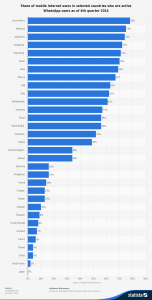Whatsapp? Different Network Effects in Different Countries
Have you ever heard of the instant messaging app “Whatsapp”? Probably not, even if you did, there is a big chance that you are not an active user of it.
I have lived in Europe until I came to Cornell for college, and for me messaging meant either using iMessage or Whatsapp; it was very unlikely of me to use text message, for it meant that I would be charged a certain amount of money for every text I sent. Furthermore, all (almost) of my friends and family used Whatsapp. Hence, it was really convenient of me to use it as well. As we have learnt in class, it is obvious that I was a victim to “network effects”. Everyone in my social circle used Whatsapp and so did I.
Then I came to United States for college. First few weeks, I was surprised that most of my friends have never even heard of Whatsapp. I found this particularly interesting since Mark Zuckerberg had just bought Whatsapp, and had been sharing updates about Whatsapp on his Facebook page quite regularly. How did Americans, who are active users of Facebook, had never heard of Whatsapp, an app that has one billion users?
The more I thought about this, the more it started to make sense. It can be understood through the different network effects in different countries. Europe consists of many small countries and Whatsapp is a great way to keep in touch when you are abroad, for it works in a wide variety of systems (such as IOS, Android, Blackberry), and by using it when you have Wi-Fi, you avoid being charged international SMS or MMS fees, which are usually really high. Hence, Whatsapp is a great way to keep in contact with your social circle, even when you are not in your own country. Furthermore, there are people who live in a different country and work in another one in Europe, a common example being London-Paris. From this it is easily seen that Whatsapp is a great way to communicate if you live in Europe. Again, the more people use it, the more valuable it becomes.
Moving on to United States, it is a big country and is not surrounded by bunch of other small countries unlike Europe. Travelling for work, or even just for leisure, usually consists of changing states, or coasts instead of changing countries. It is not as common to travel abroad as it is in Europe. Hence, there are not many occasions in which you worry about “international text messaging charges”. As a result, not many people feel the urge to download or use Whatsapp, which ends up decreasing the value it has in that specific country. Moreover, in United States, most telecommunication companies offer unlimited text messaging deals to its customers, therefore decreasing the need to use an online app to text when you are not abroad. As stated in the article “Is Whatsapp Completely Useless in United States?”, “technology is only as useful as the social connection and circles it penetrates”.
Below is a picture depicting the usage of WhatsApp in different countries in 2014.
(If you click on it, the quality of the picture increases and it becomes easier to read.)


your post led me to this: https://www.similarweb.com/blog/worldwide-messaging-apps